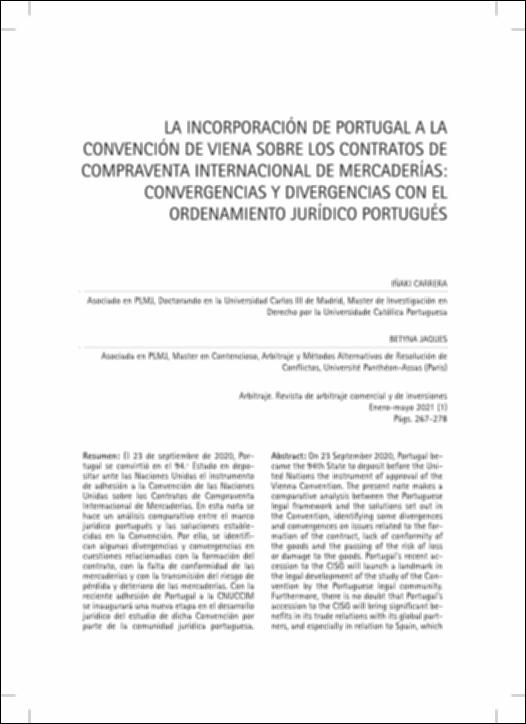Please use this identifier to cite or link to this item:
http://hdl.handle.net/10637/13627La incorporación de Portugal a la Convención de Viena sobre los contratos de compraventa internacional de mercaderías convergencias y divergencias con el ordenamiento jurídico portugués.
| Title: | La incorporación de Portugal a la Convención de Viena sobre los contratos de compraventa internacional de mercaderías convergencias y divergencias con el ordenamiento jurídico portugués. |
| Authors : | Carrera, Iñaki Jacques, Betyna |
| Keywords: | Portugal.; Compraventa internacional de mercaderías.; CNUCCIM.; Ley aplicable; Arbitraje internacional.; International sale of goods.; CISG.; Applicable law.; International arbitration. |
| Abstract: | El 23 de septiembre de 2020, Portugal se convirtió en el 94.º Estado en depositar ante las Naciones Unidas el instrumento
de adhesión a la Convención de las Naciones
Unidas sobre los Contratos de Compraventa
Internacional de Mercaderías. En esta nota se
hace un análisis comparativo entre el marco
jurídico portugués y las soluciones establecidas en la Convención. Por ello, se identifican algunas divergencias y convergencias en
cuestiones relacionadas con la formación del
contrato, con la falta de conformidad de las
mercaderías y con la transmisión del riesgo de
pérdida y deterioro de las mercaderías. Con la
reciente adhesión de Portugal a la CNUCCIM
se inaugurará una nueva etapa en el desarrollo
jurídico del estudio de dicha Convención por
parte de la comunidad jurídica portuguesa. Además, no cabe duda de que la adhesión de
Portugal a la CNUCCIM aportará importantes
beneficios en sus relaciones comerciales con
sus principales socios mundiales y, especialmente, en relación con España, que es signataria de la Convención desde 1991 e, históricamente, el principal socio comercial de
Portugal, habiendo sido responsable del 24,7%
de las exportaciones portuguesas y del 30,5%
de sus importaciones en 2019. On 23 September 2020, Portugal became the 94th State to deposit before the United Nations the instrument of approval of the Vienna Convention. The present note makes a comparative analysis between the Portuguese legal framework and the solutions set out in the Convention, identifying some divergences and convergences on issues related to the formation of the contract, lack of conformity of the goods and the passing of the risk of loss or damage to the goods. Portugal's recent accession to the CISG will launch a landmark in the legal development of the study of the Convention by the Portuguese legal community. Furthermore, there is no doubt that Portugal's accession to the CISG will bring significant benefits in its trade relations with its global partners, and especially in relation to Spain, which has been a signatory to the Convention since 1991 and historically Portugal’s main trading partner, having been responsible for 24.7% of Portuguese exports and 30.5% of its imports in 2019. |
| Description: | En: Arbitraje: revista de arbitraje comercial y de inversiones. eISSN. 2603-9281. vol. 13, n. 1, 2021, pp 267-279 |
| URI: | http://hdl.handle.net/10637/13627 |
| Rights : | http://creativecommons.org/licenses/by-nc-nd/4.0/deed.es |
| Issue Date: | 1-May-2021 |
| Appears in Collections: | 2021 Arbitraje nº 1 |
Items in DSpace are protected by copyright, with all rights reserved, unless otherwise indicated.


